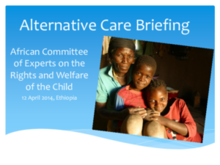This presentation, produced by Better Care Network (BCN), International Social Service (ISS), Save the Children, and SOS Children's Villages, was given at a recent briefing of the African Committee of Experts on the Rights and Welfare of the Child (ACERWC). The Committee met in Ethiopia on 12 April 2014 with the purpose of discussing how to increase visibility, understanding and support for child protection systems strengthening and child care reform within this process. The objectives of the Alternative Care Briefing were to increase the understanding of and recommendations on the implementation of the Guidelines for the Alternative Care of Children when reviewing State Party Reports and drafting general recommendations and to create opportunities to promote the Guidelines for the Alternative Care of Children in its 5th anniversary.
The Committee chose three primary points on which to focus: (1) Family strengthening and preventing separation, with examples of laws, policies, and practices in Rwanda; (2) Provision of different forms of quality care, with examples from South Africa and Algeria; (3) Special circumstances: alternative care in emergencies, with an example and toolkit from a refugee camp in Kenya. The briefing highlighted the importance of each of these points, as well as what the Guidelines say about each of these topics. The briefing also included an update on recent conferences and events in the region in which the Guidelines for Alternative Care of Children were promoted as well as an overview of applying the principles of necessity and suitability in alternative care placement.
The briefing concluded with recommendations and next steps from the Committee. The Committee recommended that mapping and/or systems assessment include care components, i.e. family strengthening and alternative care and that national child protection systems be strengthened to include care components in line with the Alternative Care Guidelines. The Committee also recommended that child protection systems, structures, functions and capacities support family strengthening and alternative care in line with the Alternative Care Guidelines; community based structures be strengthened to support families and appropriate alternative care; measures be instituted to strengthen the spectrum of care and protection and the extension of services to prevent and respond to violence, exploitation, abuse and neglect; and that the evidence and information base to support the case of child protection system strengthening be improved, among many other recommendations. The Committee’s next steps include: supporting country reporting (State & civil society) to include implementation & monitoring of Guidelines; a Day of General Discussion on Family Strengthening & Alternative Care in 2014; development of a tracking tool to monitor implementation of the Alternative Care Guidelines, which is underway; and regional expert consultations on alternative care.

